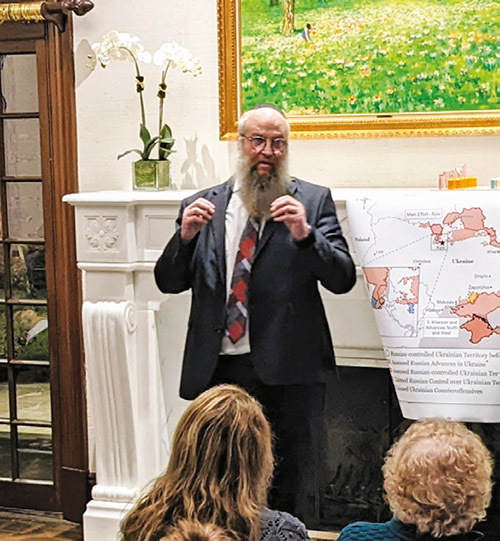


Last Wednesday night, a group of approximately 50 people met in a parlor-meeting style at a private home in Livingston. What brought everyone together? Rabbi Nachum Ehrentreu, the chief rabbi of Zaporizhzhia, Ukraine, had come to give his firsthand report of providing food, shelter and escape for Jews back home.
Rabbi Zalman Grossbaum of the Chabad of Livingston introduced the evening by mentioning the long history of Hasidut in Ukraine: the Baal Shem Tov, who lived his whole life in Ukraine, is buried there still; the Rebbe, Menachem Mendel Schneerson, was born in Mykolaiv, Ukraine.
“This moment [in history] makes us think about our parents and grandparents and the sense of urgency of the Holocaust,” Rabbi Grossbaum said, before introducing the guests of honor. But, he went on to say, each and every one of us has the power to do something.
Rabbi Ehrentreu, a tall man with a long gray beard, established the Chabad community in Zaporizhzhia, a large city in the southeast region of Ukraine, 25 years ago. He believes that before the latest war with Russia, there were 10,000 Jews living in the city of approximately 800,000.
As soon as the war broke out, Rabbi Ehrentreu, who already ran a food bank for locals in need, placed a large order with his distributors, enabling him to continue helping local families, even when grocery stores had nothing left on their shelves. But the food shortage was not the only struggle the people of Zaporizhzhia would encounter. With bombs overhead on a daily basis, people lost electricity, access to fresh water, and of course, a sense of safety.
Rabbi Ehrentreu recognized that the basement in the synagogue could be used as a bomb shelter, and soon hundreds of people were living there, relying on him and his team, for their daily needs.
Meanwhile, with many thousands of people fleeing west from the city, Rabbi Ehrentreu began to secure funds to assist families in escaping the war altogether. Commissioning buses was expensive—especially with hundreds of checkpoints set up throughout the country by Ukrainian officials. And yet, as of this date, Rabbi Ehrentreu estimates that he and his team have helped facilitate the escape of over 850 Jews from Zaporizhzhia. Most of them, he says, are now in either Israel or Germany.
One night, Rabbi Ehrentreu was on his way back from picking up food from the food bank and delivering it across town to the synagogue when he reached one of the checkpoints set up within the city. Yelled at to stop, he halted his car and got out. Suddenly, shots were fired from several directions. In tears and pleading for his life, he shouted, ‘I’m just a rabbi. I have a family. Please don’t kill me!’
The next thing he knew, soldiers surrounded him and he was taken to an interrogation room. There, he found a familiar face. “What are you doing here?” his friend exclaimed. “I don’t know!” the rabbi said.
As it turned out, Russia had recently announced that they were sending in Chechnyan militants to assist them in the war. Terrified of these combatants, the Ukrainians saw the rabbi’s long beard and mistook him for a Chechnyan. “The way I see it,” his friend told him, “you have two choices. You can cut your beard, or you can stay inside for the rest of the war.’
Realizing that option one was not an option for him, and that he could do more good abroad than being stuck inside all day and night, Rabbi Ehrentreu made the difficult decision to leave Ukraine.
The harrowing journey through the war-torn country began with a 30-hour train ride to Lviv. Crammed inside with no space to move and no breaks for bathrooms, the rabbi said when he wasn’t sleeping, he was saying Tehillim. From Lviv, it was another eight-and-a-half hours to the border, and then another four to Budapest. From there, he took a plane to Israel and arrived before Shabbat.
Now, he is using his time away from his home to raise money to help those still there. They need food, water and medicine, the rabbi said. And many still need to escape.
To support the Jewish community of Zaporizhzhia, Ukraine, go to www.charidy.com/Zaporizhzhia.
By Talia Liben Yarmush













